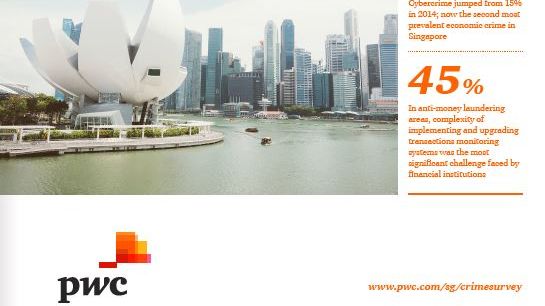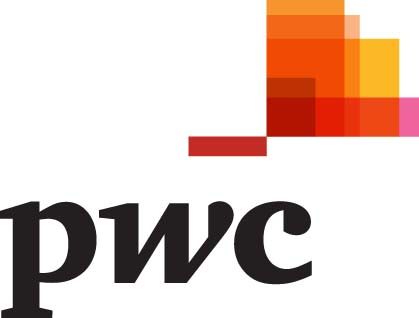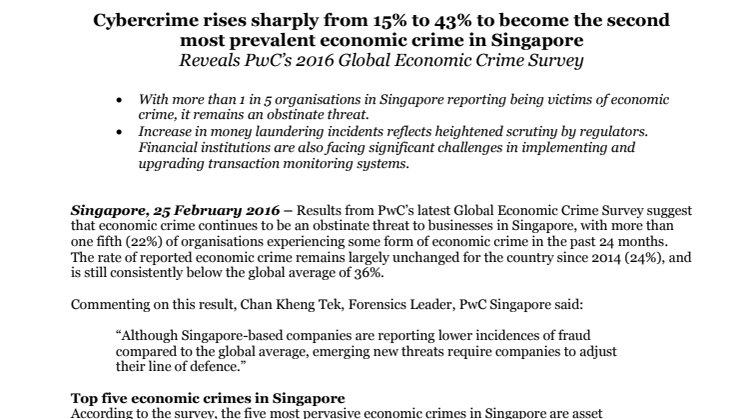
Press release -
Cybercrime rises sharply from 15% to 43% to become the second most prevalent economic crime in Singapore reveals PwC’s 2016 Global Economic Crime Survey
| Date | 26 February 2016 |
Contact | Candy Li Tel: +65 6236 7429 Mobile: +65 8613 8820 E-mail: candy.yt.li@sg.pwc.com Natalie Choo Tel: +65 6236 4309 Mobile: +65 9738 1415 E-mail: natalie.yl.choo@sg.pwc.com |
- With more than 1 in 5 organisations in Singapore reporting being victims of economic crime, it remains an obstinate threat.
- Increase in money laundering incidents reflects heightened scrutiny by regulators. Financial institutions are also facing significant challenges in implementing and upgrading transaction monitoring systems.
Singapore, 26 February 2016 – Results from PwC’s latest Global Economic Crime Survey suggest that economic crime continues to be an obstinate threat to businesses in Singapore, with more than one fifth (22%) of organisations experiencing some form of economic crime in the past 24 months. The rate of reported economic crime remains largely unchanged for the country since 2014 (24%), and is still consistently below the global average of 36%.
Commenting on this result, Chan Kheng Tek, Forensics Leader, PwC Singapore said:
“Although Singapore-based companies are reporting lower incidences of fraud compared to the global average, emerging new threats require companies to adjust their line of defence.”
Top five economic crimes in Singapore
According to the survey, the five most pervasive economic crimes in Singapore are asset misappropriation (61%), cybercrime (43%), procurement fraud (35%), money laundering (26%) and bribery and corruption (17%). Globally, asset misappropriation (64%) and cybercrime (32%) also occupy two leading positions, followed by bribery and corruption (24%), procurement fraud (23%) and accounting fraud (18%).
Asset Misappropriation: The percentage of asset misappropriation incidents in Singapore (61%) is at an all-time low since 2009. While there has been a steady decrease since 2011, it does not mean that fraud incidents of this nature are on the decline. Instead, it could mean that fraudsters are using more sophisticated approaches which may not be detected and prevented by existing controls in the organisations.
Cybercrime: Cybercrime incidents have risen sharply from 15% in 2014 to 43% in 2016, becoming the second most prevalent economic crime in Singapore. This figure is also higher than the global average of 32%. Despite this increasing threat it is a concern that many organisations still do not have a fully operational incident response plan to deal with cyber incidents.
Said Chan Kheng Tek, Forensics Leader, PwC Singapore:
“The sharp increase in cybercrime is particularly worrying, especially when many Singapore-based organisations are still ill-equipped to deal with cyber-attacks.”
Procurement Fraud: More companies in Singapore suffered from procurement fraud (35%), compared to respondents in Asia Pacific region (27%) in the last 24 months. The percentage of cases in Singapore also exceeds the global average of 23%. One in five respondents in Singapore believe that their organisation will be affected by a procurement fraud incident in the next two years.
Money laundering: More economic crime related to the Anti-Money Laundering (AML) and Countering Financing of Terrorism Act (CFT) were uncovered in 2016 (26%), compared to only 5% in 2014. The increase in scrutiny by regulators may have uncovered or at least triggered the discovery of AML/CFT related incidents. Separately, 45% of Singapore respondents compared to 24% globally stated that they are struggling with the complexity of implementing and upgrading their transaction monitoring systems.
Bribery and Corruption: Bribery and corruption in Singapore (17%), while still a major economic crime, is lower than the regional average of 28%. The higher regional risk may be a concern to companies with footprints, or intending to expand, in other Southeast Asian territories. While a majority (91%) of Singapore-based companies have in place a formal business ethics and compliance programme and 95% of Singapore-based respondents have a Code of Conduct that covers this risk area, effective deployment of compliance programmes remains an issue.
Dealing with threats
More than half of the respondents (55%) in the survey attributed fraud incidents to exploitations of weaknesses in business processes, compared to 77% in 2014. This decrease aligns with the observation that more Singapore-based companies are investing resources in strengthening corporate controls (e.g. fraud risk management and suspicious transactions monitoring) and these are proving effective.
Response to fraud risk assessments: More respondents in 2016 (66%) reported that their organisations conduct fraud risk assessments at least once a year, compared to 51% in 2014. However, there is still room for improvement as 30% of respondents either currently do not perform or are unaware of whether their organisations perform any fraud risk assessments.
Said Chan Kheng Tek, Forensics Leader, PwC Singapore:
“It is encouraging that more organisations are putting in place measures to detect fraud effectively. However, as businesses evolve, risks will also change – organisations should therefore continue to be vigilant and keep pace with the level and range of threats that they will inevitably face. Investing time and resources in tightening controls and minimising weaknesses in processes will be a company’s best defence against frauds of any nature.”
-ENDS-
NOTES TO EDITORS
About the survey
PwC’s Global Economic Crime Survey was conducted through an online survey of 6,337 respondents in 115 countries, of which 103 were from Singapore. In the global survey, 45% of the respondents are board level and 30% are heads of department/business units. 59% of respondents were from multinational organisations and 37% from publicly listed companies. Respondents came from all sectors – including industrial (35%), financial services (24%), consumer (14%), technology (7%), and professional services (6%). The survey was conducted between July 2015 and February 2016.
Related links
Topics
Categories
About PwC
At PwC, our purpose is to build trust in society and solve important problems. We’re a network of firms in 157 countries with more than 208,000 people who are committed to delivering quality in assurance, advisory and tax services. Find out more and tell us what matters to you by visiting us at www.pwc.com.
PwC refers to the PwC network and/or one or more of its member firms, each of which is a separate legal entity. Please see www.pwc.com/structure for further details.
©2016 PwC. All rights reserved



